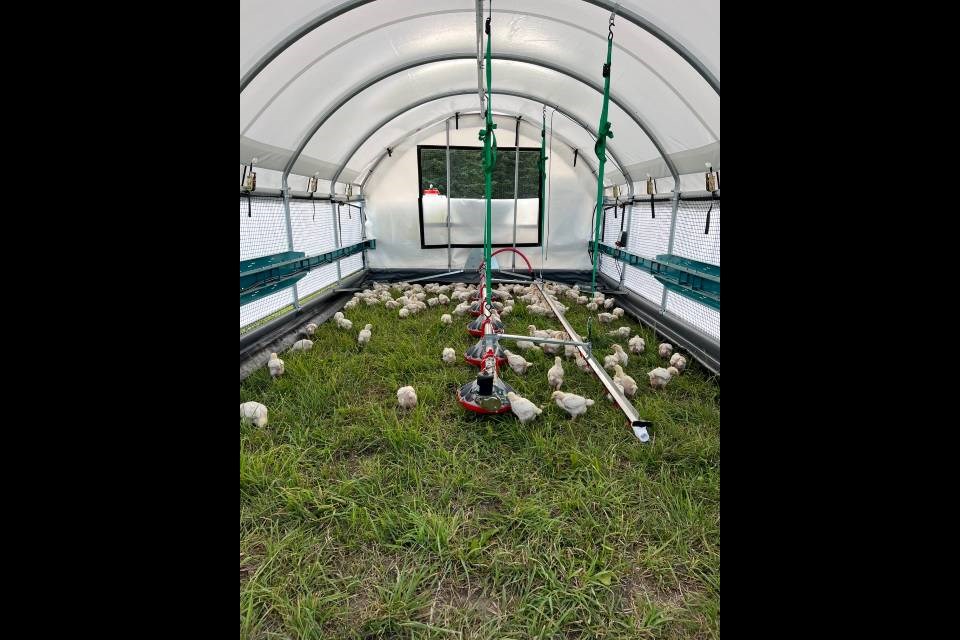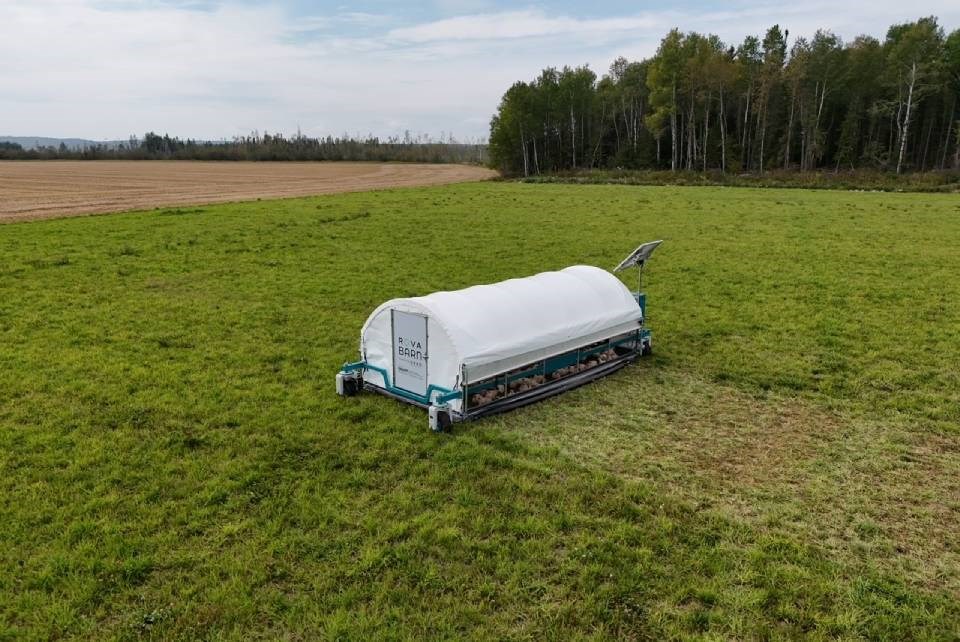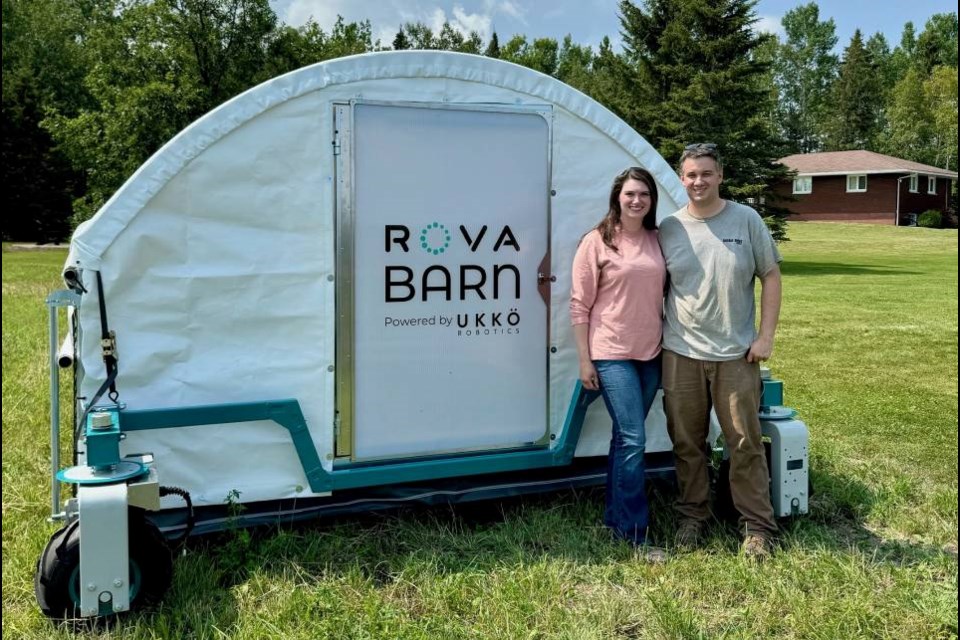The chickens on Manners Farms were happier, healthier, and tastier after a trial run of Northern Ontario’s first fully automated pasture barn this past summer.
Farming couple Zach and Chelsea Manners are the first in the North to follow the burgeoning trend toward farming automation on their 160-acre poultry farm in the heart of Temiskaming Shores’ agricultural district. But they likely will not be the last.
“It’s 100 per cent changed our routines,” said Zach. “I don’t have to get up quite so early to do chores. It doesn’t get to the point of burnout so it lets you enjoy farming.”
Before buying their Rova Barn, manufactured by the Manitoba-based company Ukkö Robotics, Zach had been tied down to a “daily grind” of feeding the birds several times a day in a “controlled feed” program to prevent the negative health effects that result from over-feeding.
“With the old system,” said Zach, “I was weighing feed every day, driving out to the pasture with the tractor, and filling the waters.”
Watch the video below to watch Ukkö Robotics' Rova Barn in action:
After seeing and tentatively pricing the Rova Barn online, the Manners thought they would have to put off buying one until they managed to save enough money.
But the couple were able to acquire the technology much sooner as a result of receiving a grant through the Sustainable New Agri-Food Products and Productivity (SNAPP) program administered by the Rural Agri-Innovation Network (RAIN).
A division of the Sault Ste. Marie Innovation Centre, RAIN strives to enhance farming and food sector business growth by developing initiatives through innovative research and agricultural development projects.
SNAPP provides individual applicants like Manners Farms with up to $10,000 at 50 per cent cost-share towards the purchase of equipment or technology that will allow for enhanced productivity and efficiency through innovation.
“Had we not got the grant, we would have had to wait a year, maybe two,” Zach said. “It was a big help.”
And so is the Rova Barn, which eliminates the need for constant daily maintenance by utilizing a bulk tank for grain, automatic feeders, and a bulk tank for water.
“It’s essentially once a week, fill up the water, fill up the feed, keep an eye on it and let it do it’s thing,” said Zach.
The 200-square-foot barn contains up to 150 chickens at once, and is set up on a large, flat, open pasture. Following a pre-programmed schedule, the barn moves via wheels along the pasture up to 20 times per day to provide the poultry with fresh foraging.
The barn is highly customizable and can be programmed for optimal comfort and safety of the animals.
“You move them throughout the morning and leave them in the afternoon when it gets hot, and leave them in the evening when it cools off,” Zach said.
Farmers can keep an eye on the barn via a smartphone app, which has cameras that can be used to monitor the chickens from anywhere in the world, and also to check the temperature and ventilation within the barn.

On Instagram, Manners Farms posts about the process of introducing the chickens to the moving barn by starting with moving them once daily under supervision, so the birds can get accustomed to “…the sights and sounds of their new home moving to fresh grass.”
The Manners say saving northern farmers time while maintaining high standards is a huge benefit for farming families like theirs seeking to provide products to Northern Ontario. Most small-scale farmers or niche agricultural businesses in the North are run by farmers who have full-time jobs in addition to their farming businesses.
Zach currently works full-time as a mechanic at his family’s business, Precision Auto Body, and Chelsea works as a pharmaceuticals buyer at Findlay’s Drug Store in New Liskeard in addition to handling Manners Farms’ direct-to-customer sales.
Chelsea, who comes from a family of fourth-generation Northern Ontario dairy farmers, said she’s hopeful about technology like the Rova Barn helping overtaxed northern farming families who are often suffering from burnout.
“My dad missed out on a lot of family things, so it allows people to have more time with their families,” she said.
The technology also allows Manners Farms to stand out to buyers in Temiskaming, where only a handful of other farms offer pasture-raised poultry.
“It’s giving you the benefit of raising things on pasture without all the work,” said Zach.
Raising birds on pasture is more labour-intensive than traditional barn-raised poultry, but the Manners believe the end product is worth the higher standard. Local consumers are seeking out pasture-raised poultry because of things like the higher quality of the meat and the increased health benefits.
“There’s extra omega-3 (fatty acids) and higher vitamin D,” said Chelsea. “And there’s a lot less fat on the birds as opposed to barn birds.”
Pasture foraging allows for a more varied and nutritious diet than solely feeding grain, and it also allows for the birds to move more, resulting in leaner meat and larger, stronger birds.

Zach was surprised to see that the first poultry he raised using the Rova Barn were on average a full pound heavier while still maintaining better health.
When the Manners first asked family and friends if they could taste the difference, they replied with a resounding ‘yes.’ Their repeat customers and steadily growing customer base is also a testament to the quality of their products.
“We started small [in 2022] and doubled in 2023, when we did 280,” said Zach. “This year we went right to 300.”
Small-scale poultry farmers can produce a maximum of 300 chickens annually for director-to-consumer sales, according to the Chicken Farmers of Ontario (CFO), which regulates the province's poultry industry.
For the future, Chelsea and Zach hope to expand their poultry sales under the CFO’s Artisanal Chicken Program, which would allow them to sell up to 900 chickens per year. Acquiring an additional, larger Rova Barn with increased capacity will likely be a part of this expansion.
The Manners also dream of expanding to other livestock, and continuing to grow Manners Farms enough to one day make farming their full-time jobs.




